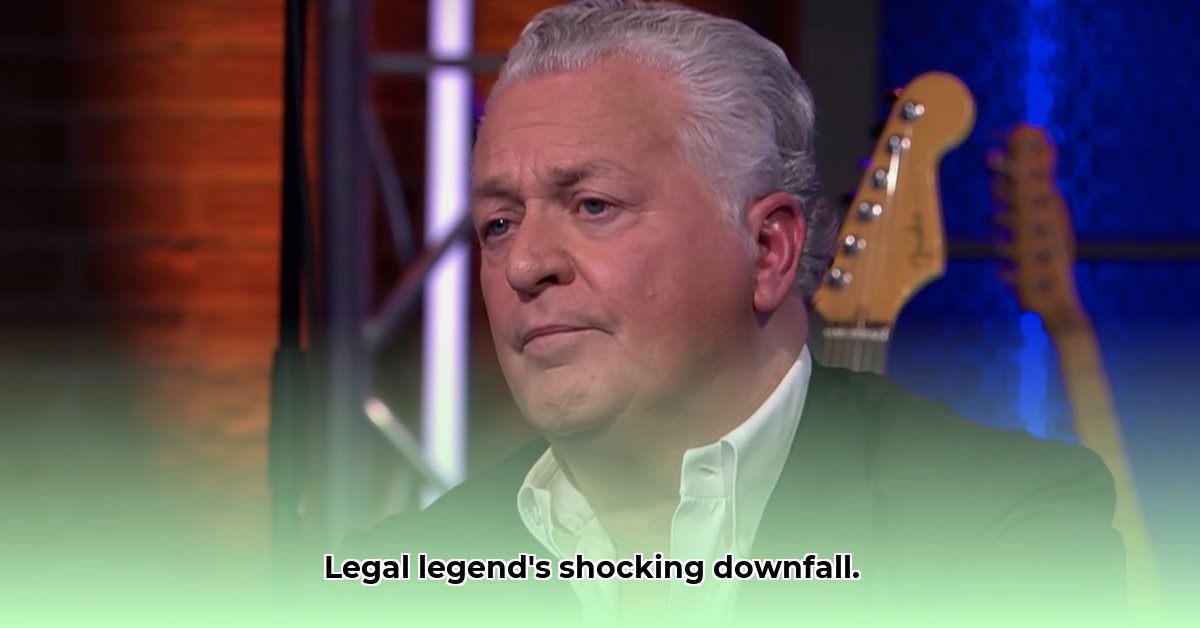
Bram Moszkowicz: A Legal Lion's Rise and Fall
Bram Moszkowicz. The name itself evokes a potent mix of admiration and controversy in the Netherlands. This prominent lawyer, renowned for defending high-profile individuals – from notorious criminals like Willem Holleeder to outspoken politicians such as Geert Wilders – experienced a dramatic career trajectory, from unparalleled success to a spectacular downfall. His story transcends a simple recounting of legal victories and defeats; it's a compelling narrative of ambition, media scrutiny, and the ultimate consequences of ethical breaches. It's a cautionary tale woven from the threads of charisma, controversy, and a profound fall from grace. How did a man who commanded the courtroom ultimately lose his way?
His early career was meteoric. He rapidly established himself as a go-to lawyer for challenging cases, skillfully navigating complex legal landscapes and winning case after case. His courtroom style was legendary – dramatic, persuasive, and undeniably effective. This string of successes cemented his reputation as an unbeatable legal heavyweight, a master of his craft. He seemed almost invincible, his successes building a formidable public image. But this impressive ascent masked a vulnerability, a potential for catastrophic failure.
His personality was a crucial element in this narrative. Moszkowicz wasn't just a lawyer; he cultivated a highly visible persona, embracing the media spotlight and actively courted publicity. This wasn't mere self-promotion; it was a carefully constructed brand, a public identity built on charisma and a calculated embrace of controversy. While this strategy boosted his profile and attracted high-paying clients, it also amplified public scrutiny. Every move, every statement, was analyzed and dissected by the media, often contributing to a cycle of misinformation and negative press. Did this craving for public attention ultimately contribute to his downfall? This remains a question central to his legacy.
Then came the tax evasion scandal, the event that triggered his dramatic fall from grace. The accusations, the trial, and the subsequent conviction marked a stark shift in public perception. The lawyer who had once appeared invincible was suddenly exposed as vulnerable and fallible. His disbarment was swift and merciless, a stark contrast to the calculated moves and prolonged battles which characterised his courtroom strategy. The public's trust evaporated overnight. Strategies that once seemed brilliant now appeared reckless and even unethical. His fall was as swift and spectacular as his rise.
Complicating the narrative further were the allegations, with conflicting reports, surrounding singer Douwe Bob. The details remain shrouded in ambiguity and divergent accounts, fueling the negative media narrative and further reinforcing public criticism. Was this an isolated incident, or was it indicative of underlying patterns of behaviour? Different interpretations exist, and the truth likely remains elusive.
Moszkowicz’s career raises crucial questions about the ethics of legal practice and the potent influence of media reporting. His representation of controversial clients highlighted the complex ethical dilemmas faced by legal professionals. Where do the boundaries of zealous advocacy lie, especially when representing individuals implicated in morally reprehensible acts? The Dutch legal system’s response, his disbarment, reflects the delicate balance between protecting individual rights and safeguarding public trust. This pivotal case represents a valuable teaching moment for legal professionals, highlighting the critical importance of ethical guidance, professional standards, and scrupulous adherence to the law.
The wider implications of Moszkowicz’s story are significant and far-reaching. His journey serves as a case study in the intricate interplay of law, media, and public perception. His legacy, though severely tarnished, remains a powerful subject for ongoing debate and analysis. It continues to spark discussions about legal advocacy, media responsibility, and ethics in the public arena. Did his achievements outweigh his transgressions? Was his remarkable talent ultimately overshadowed by his flaws? These are questions that continue to resonate, prompting reflection on human ambition and accountability.
How did media coverage influence Bram Moszkowicz's disbarment process?
The media's role in Bram Moszkowicz's downfall cannot be overstated. While his legal missteps were undeniably a contributing factor, the relentless media scrutiny played a significant, even decisive, role in shaping public opinion and ultimately influencing the disbarment process.
The Media's Spotlight and the Erosion of Trust
Moszkowicz’s career was built on high-profile cases, and he strategically cultivated a larger-than-life public image. Initially, this strategy worked. However, it had a devastating downside. Each accusation, regardless of its veracity, received disproportionate media attention. Negative reporting, often presented without complete contextual understanding or factual verification, steadily eroded public trust.
The Tax Evasion Allegations and the Media Frenzy
Sensationalized reporting of the tax evasion allegations intensified the media microscope. News outlets covered the investigation comprehensively, often presenting accusations as established fact, thereby pre-judging the case before any formal verdict. This relentless coverage created a climate of public condemnation before the legal process had even concluded. Did the unprecedented level of media attention influence the disbarment process? The evidence strongly suggests that it did.
The Power of Narrative and Public Perception
Media outlets not only reported the facts; they constructed narratives. Moszkowicz, once portrayed as a brilliant and charismatic advocate, was recast as arrogant and even corrupt. This shift in public perception severely hindered his defence; the image projected by the media often overshadowed any attempt at factual rebuttal.
Lessons Learned: Media Responsibility and Due Process
Moszkowicz's case serves as a stark reminder of the media's power to shape reputations, for better or for worse. The responsibility of maintaining objectivity, rigorously verifying information before publication, and respecting due process cannot and should not be overstated. In Moszkowicz’s case, a precarious balance between informing the public and upholding fairness in the judicial process was significantly disrupted. The enduring question remains: did the media overstep its bounds?
Key Takeaways:
- Media coverage substantially influenced public perception of Bram Moszkowicz.
- Sensationalized reporting overshadowed the legal processes.
- Negative press likely influenced the disciplinary board’s decisions.
- The case highlights the importance of responsible journalism and due process.
- Moszkowicz’s experience underscores the potential for media narratives to eclipse objective reality.